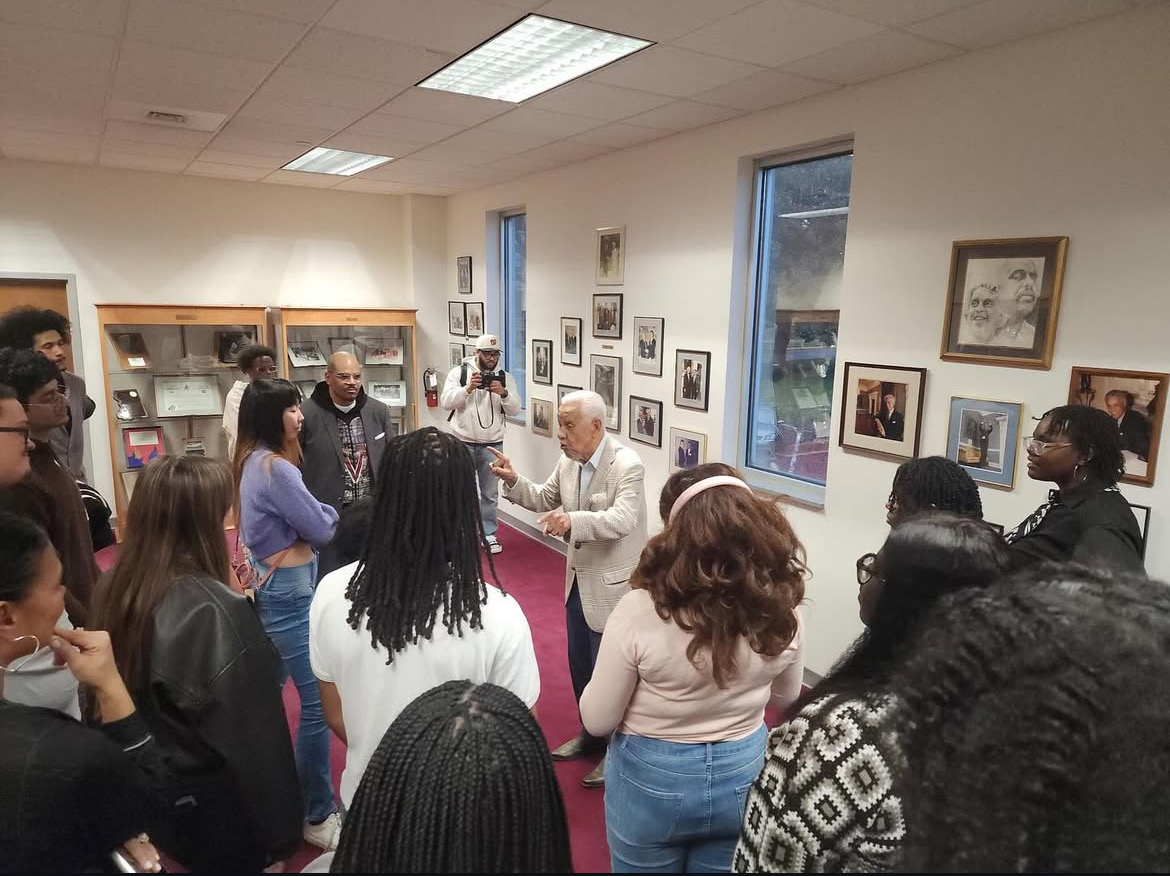On Oct. 22, Upward Bound, Educational Talent Search, and Student Support Services (TRIO) and the Student Engagement Series hosted the second Student Engagement Series Real World Ready workshop of the term: Budgeting 102. This workshop series aims to build students’ hands-on practice with financial literacy and real-world readiness. The session focused on budgeting techniques and tracking expenses. Ellie Rohman, Community Financial Wellness Coordinator for HomeTown Credit Union, led the workshop.
Participants were guided through creating a budget using the hypothetical college grad they called Olivia and her expenses. Olivia, a senior art student, has a part-time job and helps her family financially. Her monthly expenses include groceries ($145.23), subscriptions ($100), health insurance ($150) and sending money ($70) to her sister. In the end, when everything was added up, Olivia came up net zero. For the rest of the workshop, participants moved to making their budgets and entering their expenses to see whether they ended up above or beneath their spending and saving goals.
The workshop emphasized that budgeting is not about restricting one’s lifestyle but about taking control of finances and aligning spending with personal goals. Rohman explained that when people don’t budget, it is because they often worry they have to just go to bare-bone necessities or budgeting is simply too time-costly.
“A reason why a lot of people avoid budgeting is because they think that it means giving up everything they love and converting it to super frugal lifestyles,” Rohman said. “So that is not the case. Budgets are meant to put you in control. You are always in control of your finances. Even if things start to feel overwhelming, you always have a choice. You always have options.”
Thus, this workshop’s purpose is to provide an accessible budgeting template to get started and gain some practice. If participants want to start budgeting later, they would have the spreadsheet and the experience of working with budgeting already at their fingertips.
“So you could separate it,” Rohman said, emphasizing the flexibility of all budget templates. “You can put them together. For instance, some people, when they end up doing budgets, they’ll have ‘household,’ but some people have ‘cleaning supplies’ and ‘groceries,’ so they’ll separate them.”
Rohman also highlighted the need for honest tracking of all expenses and the benefits of setting aside savings. She pointed out that budgeting helps people to break down their spending habits. When one needs extra funds for something — like new furniture or getting new tires for a car — a budget is a good way to balance spending. So when making a big purchase, one can easily avoid overspending and draining savings when making big purchases.
“If you know there’s a big purchase you want to make, then go ahead and put that in the budget,” Rohman said. “You can put it in the savings section, in the budget to say something like, ‘savings for new purse’ or something.”
“Also, there’s no cap on how many savings accounts or checking accounts you can have at a time,” Rohman continued. “So if you’re like ‘I want another savings account for big purchases’, then you can open up an account that says ‘big purchases.’ Or, you have your emergency fund [apart from] a big purchase fund, and that can make it easier.”
Other big purchases to budget for could be the safety deposit for an apartment or boosting one’s savings and emergency rainy day funds. If a costly accident happens to someone between the time that the lease is signed and moving in, hopefully one’s savings account could ensure that there is still enough money to pay for three months worth of rent.
In the Q&A section, Rohman explained that there’s no set recommendation for how often students should check their budget. “Most people, I think, once they get into the swing of things, they might check it every week, or every two weeks,” Rohman explained. “You roughly would want the budget balance to end up around zero, give or take. A little bit isn’t bad, as long as you can see where you can where that’s coming from, and you can make adjustments later on to kind of equal it out.”
Rohman also emphasized that sticking to a budget is not the same as being frugal, and furthermore, being frugal itself can mean different things for people who have different income and lifestyles.
“[In] the budgeting framework of knowing where your money’s going, how you want it to be spent, making changes, being frugal kind of gets a bad rap,” she said. “Frugal can just mean, I don’t need four subscriptions to streaming services. I can just have one, and then after a couple months, I can cancel it and sign up for another one. So [I’m] paying the same amount each month, but I’m switching it up. That could be constituted as a frugal decision. But that doesn’t mean that you can’t have a streaming service if you want one.”
“Being frugal would also depend on how much money you have,” she continued. “If I have enough to comfortably go and get coffee every morning, then under my frugal umbrella, I still might be good. Because at the end of the day, you shouldn’t feel bad about spending.”
When asked about how to spend and save, Rohman gave a quick recap on how much of one’s income should be allocated to different areas of life. “Another good rule of thumb when it comes to budgeting, this was in our Budgeting 101 class, which is the 50-30-20 rule,” Rohman said. “Spend 50% of your income on needs, 30% on wants and 20% going into savings. So that’s kind of the rule of thumb when it comes to finances.”
“Every year, whenever you feel like your goals have changed, or you feel like you’ve spent more in one category consistently, then go ahead and switch it up,” Rohman concluded.
“I feel like that went really well, and I really enjoyed it. And I also thought the spreadsheet that we got was really helpful,” Alice Tian ’28 said after the workshop.
The next workshop will be hosted on Nov. 4, from 5:45-7:00 P.M., focusing on how to navigate world insurance and explain away insurance terminology. “For example, what is the difference between in network versus out network,” Judith Pannell, Academic Adviser and Senior Director of Student Life explained.
Pannell provided the program description upon request and encouraged everyone interested to attend: “Have you ever found yourself unsure of or confused by health insurance in the United States. You are not alone! Join us for an informative workshop to learn everything you need to know about navigating the world of health insurance. We will demystify key terminology, help you understand your health insurance choices, and equip you with tools to make informed decisions about your health coverage.”










